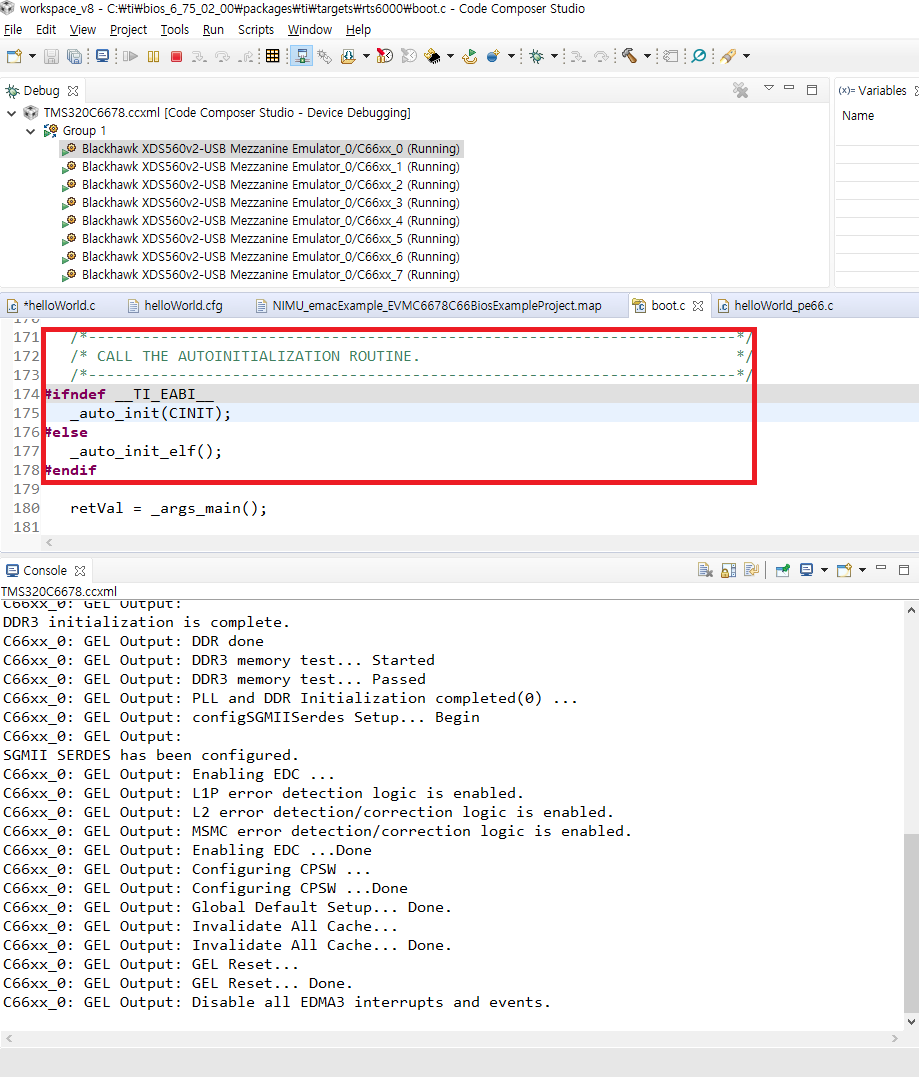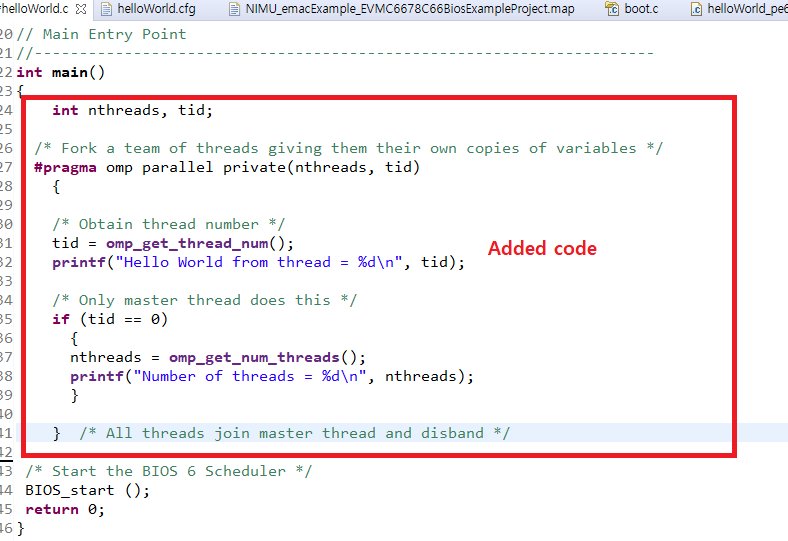Tool/software: Code Composer Studio
I use the following environment.
- CCS 8.3.1
- Ti-processor-sdk-rtos-c667x-evm-05.03.00.07
; CGT 8.3.2
; EDMA3 2.12.5
; IPC 3.50.3.05
; NDK 6.75.2.0
; SYS/BIOS 6.75.2.00
; UIA 2.30.1. 02
; OMP 2.0.13
; XDC 3.51.1.18_core
- NIMU_emacExample_EVMC6678C66BiosExampleProject
Additional openmp_dsp_c667x_2_06_03_00
Change platform... ti.runtime.openmp.platforms.evm6678
- Modify HelloWorld.c
/*
* helloWorld_bios6.c
*
* TCP/IP Stack 'Hello World!' Example ported to use BIOS6 OS.
*
* Copyright (C) 2007, 2011 Texas Instruments Incorporated - http://www.ti.com/
*
*
* Redistribution and use in source and binary forms, with or without
* modification, are permitted provided that the following conditions
* are met:
*
* Redistributions of source code must retain the above copyright
* notice, this list of conditions and the following disclaimer.
*
* Redistributions in binary form must reproduce the above copyright
* notice, this list of conditions and the following disclaimer in the
* documentation and/or other materials provided with the
* distribution.
*
* Neither the name of Texas Instruments Incorporated nor the names of
* its contributors may be used to endorse or promote products derived
* from this software without specific prior written permission.
*
* THIS SOFTWARE IS PROVIDED BY THE COPYRIGHT HOLDERS AND CONTRIBUTORS
* "AS IS" AND ANY EXPRESS OR IMPLIED WARRANTIES, INCLUDING, BUT NOT
* LIMITED TO, THE IMPLIED WARRANTIES OF MERCHANTABILITY AND FITNESS FOR
* A PARTICULAR PURPOSE ARE DISCLAIMED. IN NO EVENT SHALL THE COPYRIGHT
* OWNER OR CONTRIBUTORS BE LIABLE FOR ANY DIRECT, INDIRECT, INCIDENTAL,
* SPECIAL, EXEMPLARY, OR CONSEQUENTIAL DAMAGES (INCLUDING, BUT NOT
* LIMITED TO, PROCUREMENT OF SUBSTITUTE GOODS OR SERVICES; LOSS OF USE,
* DATA, OR PROFITS; OR BUSINESS INTERRUPTION) HOWEVER CAUSED AND ON ANY
* THEORY OF LIABILITY, WHETHER IN CONTRACT, STRICT LIABILITY, OR TORT
* (INCLUDING NEGLIGENCE OR OTHERWISE) ARISING IN ANY WAY OUT OF THE USE
* OF THIS SOFTWARE, EVEN IF ADVISED OF THE POSSIBILITY OF SUCH DAMAGE.
*
*/
//--------------------------------------------------------------------------
// IP Stack 'Hello World!' Example
//
// This is a skeleton application, intended to provide application
// programmers with a basic Stack setup, to which they can start
// adding their code.
//
// To test it as is, use with helloWorld.exe from \winapps directory
//
#include <omp.h>
#include <stdio.h>
#include <ti/ndk/inc/netmain.h>
#include <ti/transport/ndk/nimu/example/helloWorld/src/nimu_cppi_qmss_iface.h>
#ifdef _TMS320C6X
#include <ti/csl/csl_chipAux.h>
#endif
#include <ti/csl/csl_psc.h>
#include <ti/csl/csl_pscAux.h>
#ifdef __ARM_ARCH_7A__
#include <ti/csl/cslr_msmc.h>
#include <ti/csl/csl_bootcfgAux.h>
#endif
/* BIOS6 include */
#include <ti/sysbios/BIOS.h>
#ifdef _TMS320C6X
#include <ti/sysbios/family/c64p/Hwi.h>
#include <ti/sysbios/family/c64p/EventCombiner.h>
#else
#include <ti/sysbios/family/arm/gic/Hwi.h>
#include <ti/sysbios/family/arm/a15/Mmu.h>
#endif
/* Platform utilities include */
//#include "ti/platform/platform.h"
//#include "ti/platform/resource_mgr.h"
/* Platform Information - we will read it form the Platform Library */
//platform_info gPlatformInfo;
//---------------------------------------------------------------------------
// Title String
//
char *VerStr = "\nTCP/IP Stack 'Hello World!' Application\n\n";
// Our NETCTRL callback functions
static void NetworkOpen();
static void NetworkClose();
static void NetworkIPAddr( uint32_t IPAddr, uint32_t IfIdx, uint32_t fAdd );
// Fun reporting function
static void ServiceReport( uint32_t Item, uint32_t Status, uint32_t Report, void* hCfgEntry );
// External references
extern int dtask_udp_hello();
//---------------------------------------------------------------------------
// Configuration
//
char *HostName = "tidsp";
char *LocalIPAddr = "192.168.1.4";
char *LocalIPMask = "255.255.255.0"; // Not used when using DHCP
char *GatewayIP = "192.168.1.1"; // Not used when using DHCP
char *DomainName = "demo.net"; // Not used when using DHCP
char *DNSServer = "0.0.0.0"; // Used when set to anything but zero
// Simulator EMAC Switch does not handle ALE_LEARN mode, so please configure the
// MAC address of the PC where you want to launch the webpages and initiate PING to NDK */
Uint8 clientMACAddress [6] = {0xd4, 0xbe, 0xd9, 0x3d, 0xb6, 0xb8}; /* MAC address for my PC */
//---------------------------------------------------------------------
// Main Entry Point
//---------------------------------------------------------------------
int main()
{
int nthreads, tid;
/* Fork a team of threads giving them their own copies of variables */
#pragma omp parallel private(nthreads, tid)
{
/* Obtain thread number */
tid = omp_get_thread_num();
printf("Hello World from thread = %d\n", tid);
/* Only master thread does this */
if (tid == 0)
{
nthreads = omp_get_num_threads();
printf("Number of threads = %d\n", nthreads);
}
} /* All threads join master thread and disband */
/* Start the BIOS 6 Scheduler */
BIOS_start ();
return 0;
}
//
// Main Thread
//
int StackTest()
{
int rc;
int i;
void* hCfg;
NIMU_QMSS_CFG_T qmss_cfg;
NIMU_CPPI_CFG_T cppi_cfg;
#ifdef __ARM_ARCH_7A__
/* Add MMU entries for MMR's required for PCIE example */
Uint32 privid, index;
CSL_MsmcRegs *msmc = (CSL_MsmcRegs *)CSL_MSMC_CFG_REGS;
Mmu_DescriptorAttrs attrs;
extern char ti_sysbios_family_arm_a15_Mmu_Module_State_0_secondLevelTableBuf_1__A;
uint32_t addr = (uint32_t)&ti_sysbios_family_arm_a15_Mmu_Module_State_0_secondLevelTableBuf_1__A;
Mmu_initDescAttrs(&attrs);
attrs.type = Mmu_DescriptorType_TABLE;
attrs.shareable = 0; // non-shareable
attrs.accPerm = 1; // read/write at any privelege level
attrs.attrIndx = 0; // Use MAIR0 Register Byte 3 for
// determining the memory attributes
// for each MMU entry
// Update the first level table's MMU entry for 0x80000000 with the
// new attributes.
Mmu_setFirstLevelDesc((Ptr)0x40000000, (UInt64)addr, &attrs);
// Set up SES & SMS to make all masters coherent
for (privid = 0; privid < 16; privid++)
{
for (index = 0; index < 8; index++)
{
uint32_t ses_mpaxh = msmc->SES_MPAX_PER_PRIVID[privid].SES[index].MPAXH;
uint32_t sms_mpaxh = msmc->SMS_MPAX_PER_PRIVID[privid].SMS[index].MPAXH;
if (CSL_FEXT (ses_mpaxh, MSMC_SES_MPAXH_0_SEGSZ) != 0)
{
// Clear the "US" bit to make coherent. This is at 0x80.
ses_mpaxh &= ~0x80;
msmc->SES_MPAX_PER_PRIVID[privid].SES[index].MPAXH = ses_mpaxh;
}
if (CSL_FEXT (sms_mpaxh, MSMC_SMS_MPAXH_0_SEGSZ) != 0)
{
// Clear the "US" bit to make coherent. This is at 0x80.
sms_mpaxh &= ~0x80;
msmc->SMS_MPAX_PER_PRIVID[privid].SMS[index].MPAXH = sms_mpaxh;
}
}
}
#endif
if (setupRm ())
{
platform_write ("Function setupRm failed\n");
System_flush();
goto main_exit;
}
/* Initialize the components required to run this application:
* (1) QMSS
* (2) CPPI
* (3) Packet Accelerator
*/
#ifdef _TMS320C6X
if (CSL_chipReadDNUM() == 0)
{
qmss_cfg.master_core = 1;
}
#else
qmss_cfg.master_core =1;
#endif
qmss_cfg.max_num_desc = MAX_NUM_DESC;
qmss_cfg.desc_size = MAX_DESC_SIZE;
qmss_cfg.mem_region = Qmss_MemRegion_MEMORY_REGION0;
if (NIMU_initQmss (&qmss_cfg) != 0)
{
platform_write ("Failed to initialize the QMSS subsystem \n");
goto main_exit;
}
else
{
platform_write ("QMSS successfully initialized \n");
}
#ifdef _TMS320C6X
if (CSL_chipReadDNUM() == 0)
{
cppi_cfg.master_core = 1;
}
#else
cppi_cfg.master_core = 1;
#endif
cppi_cfg.dma_num = Cppi_CpDma_PASS_CPDMA;
cppi_cfg.num_tx_queues = NUM_PA_TX_QUEUES;
cppi_cfg.num_rx_channels = NUM_PA_RX_CHANNELS;
if (NIMU_initCppi (&cppi_cfg) != 0)
{
platform_write ("Failed to initialize CPPI subsystem \n");
goto main_exit;
}
else
{
platform_write ("CPPI successfully initialized \n");
}
if (NIMU_initPass()!= 0) {
platform_write ("Failed to initialize the Packet Accelerator \n");
goto main_exit;
}
else
{
platform_write ("PA successfully initialized \n");
}
//
// THIS MUST BE THE ABSOLUTE FIRST THING DONE IN AN APPLICATION!!
//
rc = NC_SystemOpen( NC_PRIORITY_LOW, NC_OPMODE_INTERRUPT );
if( rc )
{
platform_write("NC_SystemOpen Failed (%d)\n",rc);
for(;;);
}
// Print out our banner
platform_write(VerStr);
//
// Create and build the system configuration from scratch.
//
// Create a new configuration
hCfg = CfgNew();
if( !hCfg )
{
platform_write("Unable to create configuration\n");
goto main_exit;
}
// We better validate the length of the supplied names
if( strlen( DomainName ) >= CFG_DOMAIN_MAX ||
strlen( HostName ) >= CFG_HOSTNAME_MAX )
{
platform_write("Names too long\n");
goto main_exit;
}
// Add our global hostname to hCfg (to be claimed in all connected domains)
CfgAddEntry( hCfg, CFGTAG_SYSINFO, CFGITEM_DHCP_HOSTNAME, 0,
strlen(HostName), (uint8_t *)HostName, 0 );
// If the IP address is specified, manually configure IP and Gateway
#if defined(_SCBP6618X_) || defined (DEVICE_C6678) || defined(_EVMTCI6614_) || defined(DEVICE_K2H) || defined(DEVICE_K2K) || defined(DEVICE_K2L) || defined(DEVICE_K2E)
/* SCBP6618x, EVMTCI6614, EVMK2H, EVMK2K always uses DHCP */
if (1)
#else
if (!platform_get_switch_state(1))
#endif
{
CI_IPNET NA;
CI_ROUTE RT;
uint32_t IPTmp;
platform_write("StackTest: using localIp\n");
// Setup manual IP address
bzero( &NA, sizeof(NA) );
NA.IPAddr = inet_addr(LocalIPAddr);
NA.IPMask = inet_addr(LocalIPMask);
strcpy( NA.Domain, DomainName );
NA.NetType = 0;
// Add the address to interface 1
CfgAddEntry( hCfg, CFGTAG_IPNET, 1, 0,
sizeof(CI_IPNET), (uint8_t *)&NA, 0 );
// Add the default gateway. Since it is the default, the
// destination address and mask are both zero (we go ahead
// and show the assignment for clarity).
bzero( &RT, sizeof(RT) );
RT.IPDestAddr = 0;
RT.IPDestMask = 0;
RT.IPGateAddr = inet_addr(GatewayIP);
// Add the route
CfgAddEntry( hCfg, CFGTAG_ROUTE, 0, 0,
sizeof(CI_ROUTE), (uint8_t *)&RT, 0 );
// Manually add the DNS server when specified
IPTmp = inet_addr(DNSServer);
if( IPTmp )
CfgAddEntry( hCfg, CFGTAG_SYSINFO, CFGITEM_DHCP_DOMAINNAMESERVER,
0, sizeof(IPTmp), (uint8_t *)&IPTmp, 0 );
}
// Else we specify DHCP
else
{
platform_write("StackTest: using dhcp\n");
CI_SERVICE_DHCPC dhcpc;
// Specify DHCP Service on IF-1
bzero( &dhcpc, sizeof(dhcpc) );
dhcpc.cisargs.Mode = CIS_FLG_IFIDXVALID;
dhcpc.cisargs.IfIdx = 1;
dhcpc.cisargs.pCbSrv = &ServiceReport;
CfgAddEntry( hCfg, CFGTAG_SERVICE, CFGITEM_SERVICE_DHCPCLIENT, 0,
sizeof(dhcpc), (uint8_t *)&dhcpc, 0 );
}
//
// Configure IPStack/OS Options
//
// We don't want to see debug messages less than WARNINGS
rc = DBG_WARN;
CfgAddEntry( hCfg, CFGTAG_OS, CFGITEM_OS_DBGPRINTLEVEL,
CFG_ADDMODE_UNIQUE, sizeof(uint32_t), (uint8_t *)&rc, 0 );
//
// This code sets up the TCP and UDP buffer sizes
// (Note 8192 is actually the default. This code is here to
// illustrate how the buffer and limit sizes are configured.)
//
// UDP Receive limit
rc = 8192;
CfgAddEntry( hCfg, CFGTAG_IP, CFGITEM_IP_SOCKUDPRXLIMIT,
CFG_ADDMODE_UNIQUE, sizeof(uint32_t), (uint8_t *)&rc, 0 );
rc = 4096; // increase stack size
CfgAddEntry(hCfg, CFGTAG_OS, CFGITEM_OS_TASKSTKBOOT,
CFG_ADDMODE_UNIQUE, sizeof(uint32_t), (uint8_t *)&rc, 0 );
//
// Boot the system using this configuration
//
// We keep booting until the function returns 0. This allows
// us to have a "reboot" command.
//
do
{
rc = NC_NetStart( hCfg, NetworkOpen, NetworkClose, NetworkIPAddr );
} while( rc > 0 );
// Delete Configuration
CfgFree( hCfg );
// Close the OS
main_exit:
printf("StackTest: exiting\n");
NC_SystemClose();
return(0);
}
//
// System Task Code [ Server Daemon Servers ]
//
static void* hHello=0;
//
// NetworkOpen
//
// This function is called after the configuration has booted
//
static void NetworkOpen()
{
// Create our local server
hHello = DaemonNew( SOCK_DGRAM, 0, 7, dtask_udp_hello,
OS_TASKPRINORM, OS_TASKSTKNORM, 0, 1 );
}
//
// NetworkClose
//
// This function is called when the network is shutting down,
// or when it no longer has any IP addresses assigned to it.
//
static void NetworkClose()
{
DaemonFree( hHello );
}
//
// NetworkIPAddr
//
// This function is called whenever an IP address binding is
// added or removed from the system.
//
static void NetworkIPAddr( uint32_t IPAddr, uint32_t IfIdx, uint32_t fAdd )
{
uint32_t IPTmp;
if( fAdd )
printf("Network Added: ");
else
printf("Network Removed: ");
// Print a message
IPTmp = NDK_ntohl( IPAddr );
printf("If-%d:%d.%d.%d.%d\n", IfIdx,
(uint8_t)(IPTmp>>24)&0xFF, (uint8_t)(IPTmp>>16)&0xFF,
(uint8_t)(IPTmp>>8)&0xFF, (uint8_t)IPTmp&0xFF );
}
//
// Service Status Reports
//
// Here's a quick example of using service status updates
//
static char *TaskName[] = { "Telnet","HTTP","NAT","DHCPS","DHCPC","DNS" };
static char *ReportStr[] = { "","Running","Updated","Complete","Fault" };
static char *StatusStr[] = { "Disabled","Waiting","IPTerm","Failed","Enabled" };
static void ServiceReport( uint32_t Item, uint32_t Status, uint32_t Report, void* h )
{
printf( "Service Status: %-9s: %-9s: %-9s: %03d\n",
TaskName[Item-1], StatusStr[Status],
ReportStr[Report/256], Report&0xFF );
//
// Example of adding to the DHCP configuration space
//
// When using the DHCP client, the client has full control over access
// to the first 256 entries in the CFGTAG_SYSINFO space.
//
// Note that the DHCP client will erase all CFGTAG_SYSINFO tags except
// CFGITEM_DHCP_HOSTNAME. If the application needs to keep manual
// entries in the DHCP tag range, then the code to maintain them should
// be placed here.
//
// Here, we want to manually add a DNS server to the configuration, but
// we can only do it once DHCP has finished its programming.
//
if( Item == CFGITEM_SERVICE_DHCPCLIENT &&
Status == CIS_SRV_STATUS_ENABLED &&
(Report == (NETTOOLS_STAT_RUNNING|DHCPCODE_IPADD) ||
Report == (NETTOOLS_STAT_RUNNING|DHCPCODE_IPRENEW)) )
{
uint32_t IPTmp;
// Manually add the DNS server when specified
IPTmp = inet_addr(DNSServer);
if( IPTmp )
CfgAddEntry( 0, CFGTAG_SYSINFO, CFGITEM_DHCP_DOMAINNAMESERVER,
0, sizeof(IPTmp), (uint8_t *)&IPTmp, 0 );
}
}
- Modify HelloWorld.cfg 7080.helloWorld.cfg
modify >> Program.sectMap[".far:NDK_PACKETMEM"] = {loadSegment: "DDR3", loadAlign: 128};
Added OMP-related CFG files
//##################
... Added part ...
//##################
In the latest SDK, we are working on a project to use OpenMP and NDK.
However, the main() function does not enter. as see above modifications are made.
The core runs in the function c_int00().
>> We want to use NDK and OpenMP on the latest SDK base.
We want to combine two examples.
However, this integration does not enter the main() function.
How do we integrate?


